Black Blocs hijack Brazil teacher protests
- Published
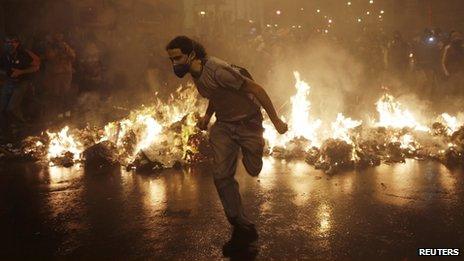
The actions of the Black Blocs on the fringes of the main demonstration turned a peaceful event violent
The violent scenes in the heart of Rio de Janeiro on Monday night have rather clumsily been blamed on "protesters" in general by the Brazilian media - in particular those organisations which are seen as pro-government.
That "one-size-fits-all" label misrepresents the intentions of as many as 10,000 teachers, students and trades unionists who called for a peaceful and dignified march.
It also fails to address the intentions and motivations of those few, masked young men who smashed, burned, and vandalised their way through Rio's historic centre in an orgy of violence.
What happened was perhaps predictable, given the way recent anti-government demonstrations in Brazil are organised almost haphazardly through social media websites, and are always attended by a plethora of organisations with an axe to grind and an opinion to voice.
As demonstrators gathered near Candelaria, in downtown Rio, it was clear to most observers that they were overwhelmingly middle- and working-class professionals.
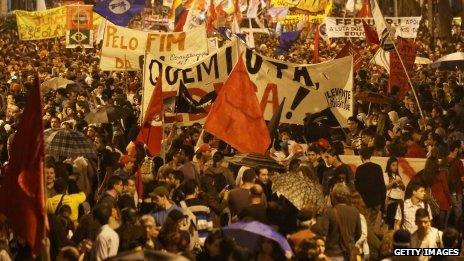
Teachers who have been pressing for a pay raise for two months said 50,000 people went onto the streets to give them support
Teachers and other public sector workers have become increasingly desperate and frustrated as their wages fail to keep pace with the soaring cost of living in Brazil.
The resentment has been fuelled, they argue, by excessive government spending on high-profile sporting events like the forthcoming Olympic Games and World Cup.
There were also, notably, many young people as the protest noisily but orderly progressed down Avenida Rio Branco.
High school students, some in their white and blue local authority-issue school "uniform", came along in support of their professors.
While many teachers and students complained about the heavy-handed way in which riot police had dealt with their last demonstration, on Monday night the military police were conspicuous by their apparent absence.
Black Blocs enigma
Not absent, though, were the other disparate groups that make up a protest "movement" which has no titular leader, dominant organisation or single banner under which to unite.
Communists, anarchists, employees from the state health sector and transport workers were all represented.
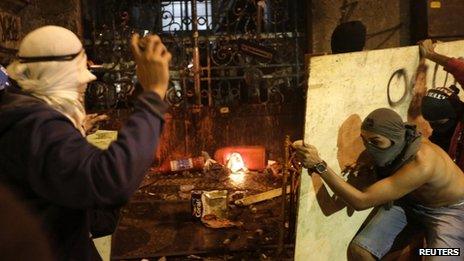
The Black Blocs are an enigma and nobody really knows who they are
Some waved political flags and almost all chanted slogans critical of the Rio de Janeiro state governor, Sergio Cabral, and mayor Eduardo Paes.
But also striding down Rio Branco were 200 to 300 young men, and a few women, dressed head to toe in black.
Almost all had their faces covered, although few wear masks these days as that is now an arrestable offence under a recent and controversial decree from the governor.
These are the Black Blocs and it was their actions on the fringes of the main demonstration that turned a hitherto peaceful event violent.
On previous occasions I have witnessed first-hand and seen powerful video evidence to support allegations that the security forces themselves have orchestrated or agitated violence in the crowd to justify their own, subsequent, actions but that did not seem to be the case in Rio, at least, last night.
There would later be criticism of the police from some quarters for being relatively slow to react and for not marshalling the demonstration in any way.
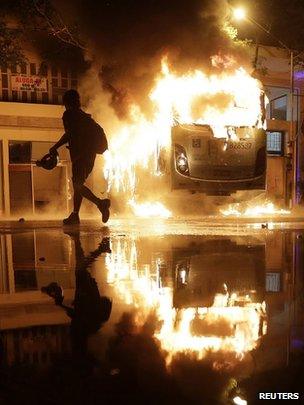
The violence has left many Brazilians shocked
The Black Blocs are an enigma and nobody really knows who they are.
Anarchists? Frustrated youth? Ideologically driven anti-capitalists determined to embarrass the government and cause maximum disruption when the eyes of the world are on Brazil?
They are not unique to Brazil and have been devastatingly and destructively active in anti-globalisation protests from Seattle to Greece to Egypt.
They are not permanent nor typical (in the sense they don't belong to any social group or profession). They also thrive in cyberspace, organising their actions via Facebook and other social media sites.
The Black Blocs despise symbols of authority and, even more so, big multinational corporations which they accuse of defrauding Brazil and its people.
It was no surprise, therefore, that the Council Chamber and the nearby Banco do Brasil building in Rio de Janeiro's historical centre were among the first targets for the Bloc when things turned ugly.
After riot police were belatedly deployed, the rioters retreated, vandalising banks and smashing windows as they melted into the shadows.
The violence may have been isolated to a relatively unpopulated part of Rio's downtown business district but it has left many Brazilians shocked and asking tough questions about the future and direction of the protest movement.
Relishing the fight
Reaction to the events of Monday night, both in Rio and Sao Paulo - where there were smaller demonstrations on this occasion - has been mixed; outright condemnation in political circles and in the mainstream media mixed with more subtle reflections from other groups involved in the protests.
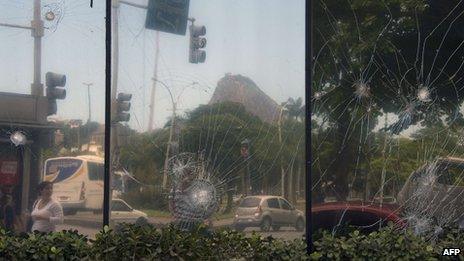
There are few credible solutions being offered to deal with the crisis
Some teachers and other unions took to the internet to condemn the "hijacking" of their peaceful march.
Some demanded to know who the Black Bloc represented and what right they had to divert attention from the main message of the evening.
But there was also a small minority of people arguing that the destruction was an inevitable symptom of a system where, hitherto, the riot police had been accused of using excessive violence against protesters, and where corrupt politicians lined their pockets while ordinary Brazilians struggle to make ends meet.
At all levels - city, state and federal - few credible solutions are being offered to deal with the crisis in Brazil's big cities.
President Dilma Rousseff's government says it is listening to the protesters' demands and has made concessions in areas like health and education but there are some hard-liners out there, on both sides, who seem to be relishing the fight.
- Published8 October 2013
- Published12 July 2013
- Published27 July 2013
- Published8 September 2013
- Published2 October 2013